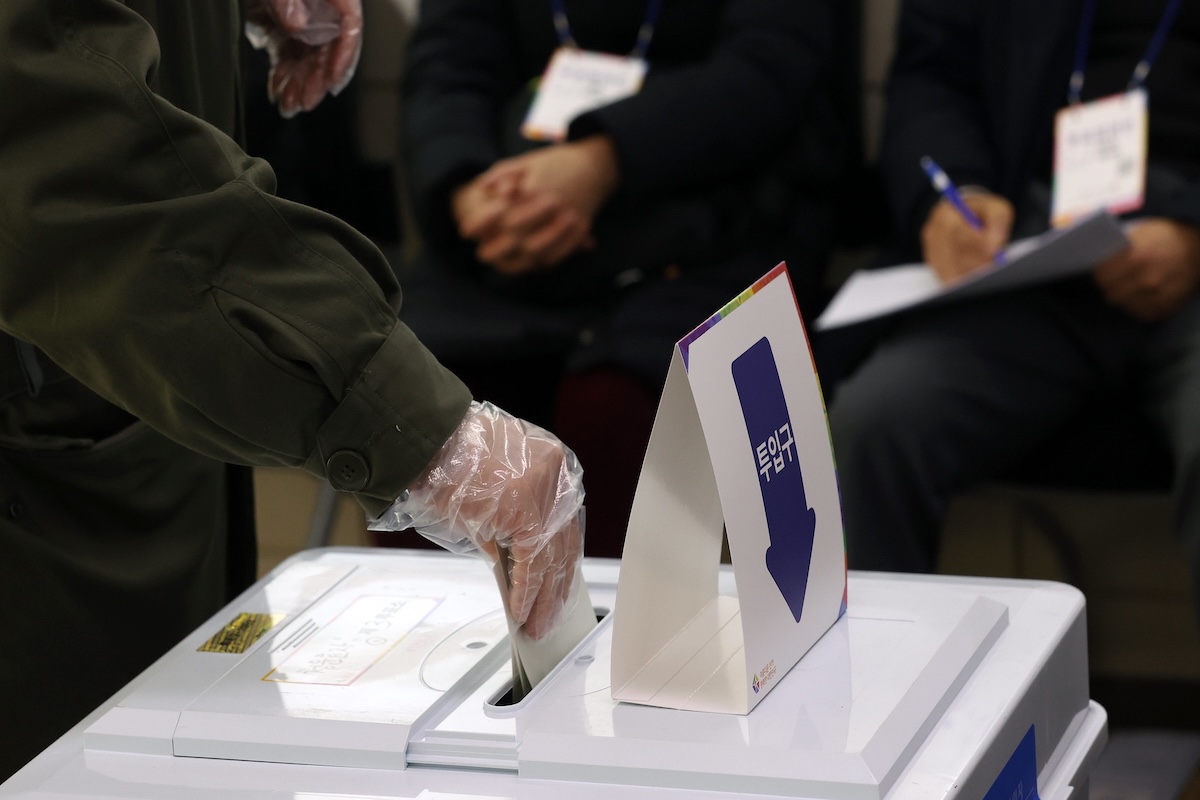ATLANTA – Won Tak Jung, a Korean resident of Memphis, Tennessee, drove six hours to Atlanta, Georgia, on May 21 to vote in the upcoming South Korean presidential election.
“I’ve lived in the United States for 40 years, but I’ve always voted in Korean elections. This presidential election is about protecting democracy. I felt I am obligated to vote,” said Jung.
South Korea will hold presidential elections on June 3 as the country seeks to replace impeached former conservative President Yoon Seok Yeol, who was removed from office in April after declaring martial law late last year in an attempt to block opposition lawmakers.
Korean voters in the U.S. were given a five-day window to cast their ballots at one of 37 polling places across the country starting May 21.

“Despite the tight election schedule, voter registration and turnout among Koreans in the U.S. is very high,” said Kwangsik Chung with the Overseas Voting Commission of the South Korean Consulate General in Los Angeles. “Korean immigrants are very interested in the political situation in Korea.”
Memories of a darker past
Yoon’s impeachment after serving just three years of a five-year term has thrown politics in South Korea, a key U.S. ally, into disarray. Yoon now faces charges of insurrection with a criminal trial underway.
Thursday’s election pits Lee Jae Myung of the liberal Democratic Party of Korea against conservative rival Kim Moon Soo of the People Power Party. While polls have consistently shown Lee with a lead over Kim, the race has narrowed in recent weeks with Lee holding a 49% to 35% lead over Kim.
In a final rally, Lee urged voters to “change history” and “defend democracy.”
South Korean voters remain deeply divided with political polarization at its highest level in recent memory. The economy, ties with the U.S. and an increasingly assertive China, and tensions with North Korea are among the top issues on voters’ minds.
For many South Koreans, Yoon’s December 3 declaration of martial law brought back memories of a darker period when South Korea remained under military rule.
In 1980, the de facto leader of South Korea and Army General Chun Doo Hwan declared martial law amid a civil uprising in the southern city of Gwangju. The event, which would come to be known alternatively as the Gwangju Massacre or the Gwangju Uprising, claimed upwards of two hundred lives with thousands more inured. The violence marked a turning point in South Korea’s political history, leading to the country’s embrace of full democracy in 1988.
“I believe in the values of life, liberty and peace that must not be harmed,” wrote Nobel prize winning author Han Kang, whose 2014 novel Human Acts details the events in Gwangju, during Yoon’s impeachment trial. “Yoon’s impeachment is something that can preserve universal values,” she wrote, adding her voice to the chorus of those calling for Yoon’s removal from office.
“May 1980 saved December 2024,” said Park Chan Dae, the floor leader of the Democratic Party of Korea, pointing to the memory of Gwangju in remarks delivered during the impeachment trial.
Universal values

Yoon’s conservative supporters, meanwhile, have been staging rallies across South Korea, events that have come to look in appearance and tone not unlike MAGA rallies among the far right in the U.S., with signs reading “Stop the Steal,” and “Make Korea Great Again” a common sight.
Right leaning voters in South Korea are staunchly anti-communist and oppose any effort to appease South Korea’s belligerent northern neighbor. Yoon accused liberal lawmakers of doing just that when he declared martial law.
Supporters of the impeachment say this election is also about honoring the past.
“I am proud that we peacefully impeached the president,” says Yoosun Chang, professor of engineering at Kennesaw State University in Atlanta, explaining his reasons for voting in the upcoming election. “The spirit of the Gwangju Democracy Movement is peace, forgiveness, and democracy,” he added, positing that protestors who rallied in the capital last year following Yoon’s declaration “must have felt the same way.”
Dokgo Min, 76, of La Cañada, California, cited democracy and hopes for a revitalized economy.
“Korea’s democracy has been through a lot with the impeachment, but I think it will bounce back,” he said. “I hope a president will be elected who will rebuild relations with the United States and revitalize the economy.”
South Korea’s economy has stumbled in recent months following the announcement of universal tariffs imposed by the Trump Administration, with slowing growth and a widening income gap fueling anxiety over the country’s continued economic fortunes.
Overcoming division
According to the Korean National Election Commission, 53,377 Korean voters in the U.S. completed voter registration, and more than 70% of those voters cast ballots. Ballots from the U.S. were sent to Korea on May 27 and will be counted immediately after the presidential election ends on June 3.
“Overseas voting is a hard-won right for Korean citizens living abroad,” explained Chung with the consular office in Los Angeles.
“I hope my vote will help elect a good leader,” said Chris Kim, 64 and a resident of Los Angeles, while casting his vote at the Consulate General’s office.
For Professor Chang, this election demonstrates the power of democracy to right itself in times of crisis.
“Democracy is a political system that is highly adaptable in overcoming conflicts and tensions, and finding the best response,” he said, quoting a paragraph from the Constitutional Court’s ruling which confirmed the impeachment and removal of President Yoon, “as long as the self-regulatory mechanisms are functioning normally and there is institutional trust.”
Nicole Chang contributed reporting from Los Angeles.
Update: Lee Jae Myung of the center-left Democratic Party has won the election, defeating his opponent by a wide margin in an election that saw the highest turnout in South Korea in more than two decades.




